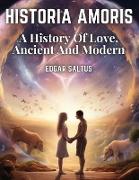Historia Amoris
BücherAngebote / Angebote:
Historia Amoris: A History of Love, Ancient and Modern" is a book by Edgar Saltus, an American author known for his works in the late 19th and early 20th centuries. Published in 1897, "Historia Amoris" explores the concept of love throughout history, examining its manifestations in both ancient and modern societies.
Key features of "Historia Amoris":
Historical Exploration: Saltus delves into the history of love, tracing its evolution from ancient civilizations to contemporary times. The book covers a broad range of cultures, exploring how attitudes, practices, and perceptions of love have changed over the centuries.
Literary Analysis: The author combines historical research with literary analysis, drawing on literature, poetry, and philosophical writings to illustrate the various expressions of love in different eras. Saltus weaves together narratives and anecdotes to provide a comprehensive view of love's role in human experience.
Cultural Perspectives: "Historia Amoris" likely offers insights into how different cultures and societies have shaped and interpreted the concept of love. Saltus may discuss how societal norms, religious beliefs, and cultural traditions have influenced the understanding and expression of love.
Philosophical Reflections: Expect philosophical reflections on the nature of love, exploring questions related to the philosophy of love, the psychology of attraction, and the cultural significance of romantic relationships.
Literary Style: Saltus was known for his eloquent and often decadent prose style. Readers can anticipate a blend of literary flair, historical narrative, and philosophical discourse in his exploration of the theme of love.
Controversial Themes: Saltus was not afraid to explore controversial or unconventional themes in his works. "Historia Amoris" may touch upon aspects of love that were considered taboo or unconventional during the time of its writing.
Cultural Impact: While Saltus was not as widely recognized as some of his contemporaries, his works, including "Historia Amoris, " contributed to the literary landscape of the late 19th and early 20th centuries. The book may provide a snapshot of the cultural attitudes towards love during that period.
Keep in mind that Saltus's writings often reflected the sensibilities of the fin de siècle (end of the century) period, characterized by a mix of decadence, aestheticism, and cultural introspection. If you're interested in exploring love from a historical, literary, and philosophical perspective, "Historia Amoris" could be a fascinating and thought-provoking read.
Folgt in ca. 10 Arbeitstagen




